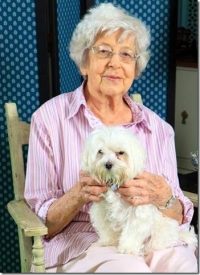We lost Lois early in May; she was 98 years young! As an avid kiter, she supported the creation of the Junction Retreat, making our quality of life complete.
"I’m the luckiest person alive…"
Before the "Women’s Movement," before "feminism," even before World War II, Lois Card was an independent, self-reliant woman with an adventurous spirit. She never took "No" for an answer after she grew up, and she remembers most of her life history as if it were yesterday.
"I guess I made my own opportunities, but I feel like I am the luckiest person alive," Card says from her Fort Worth, Texas home. Family, friends and neighbors have heard these stories, as have the professional staff members of CardioVascular Home Care, who make regular home nursing and geriatric care visit to Card, whose next "big" birthday will have three digits.
"As far back as I can remember, my mother kept trying to tell me girls didn’t do this, or didn’t do that," she laughs, recalling a fishing trip her father and her brother were planning. "I got ready to go because I wanted to," she says, but her mother insisted she stay at home.
At the heart of many of her life stories, and life decisions, is the idea that women should be able to do whatever they want. Card was a private pilot in the 1930s and a ground school flight instructor in the 1940s for men who would test their wings in World War II. She worked for American Airlines when the aviation giant was training Army Air Corps pilots. She served in General Douglas MacArthur’s headquarters after the war, letting her spirit of adventure take her across the Pacific to experience Asian culture first-hand. She graduated from college later in life, and eventually took a motorhome to Portland, Oregon, where her love of flying was transferred to creating, making and flying kites. She became a nationally recognized advocate and expert for kiteflying, and today, her closets are filled with unique and original kites.
"It is something like flying a plane," she says of kiteflying. "I organized a kiteflying group called ‘Jewels of the Sky.’ Now, JOTS has more than 250 members all around the country." Card became something of a local expert and even a celebrity among kitefliers, and was asked to organize kite festivals in Oregon and around Texas. "I promoted it everywhere I could—Galveston, Waco, Austin," she would say.
Flying has literal and figurative meaning for Card, who credits a boyfriend with a pilot’s license with igniting a spark of wonder and excitement with the great, blue yonder, nearly eight decades ago. "He took me on a flight in a little plane to Dallas, and I had never been in a small airplane before and I loved it," she says. That first experience sent her on a research mission—to find out where she could take flying lessons, how much they would cost, and whether women were "allowed" to train.
"The lessons cost $25 an hour and I borrowed money to take 10 hours’ worth of lessons," she says. Near the end of her sessions, she said she noticed some "turmoil" on the airfield and saw pilots gathering and talking. "Japan had just bombed Pearl Harbor," she said. She got her license just before Dallas and Fort Worth were swarming with young men looking for flight training with the military. Card was hired by American Airlines as a ground school instructor for instrument flight and navigation. "We trained Navy and Army pilots, and they were here for about three months before they were multi-engine and instrument rated." She says some of her students were surprised to have a woman instructor, but "during the war, women were doing a lot of things that were out of the ordinary."
Card remembers this time with pride. "I loved what I was doing and I couldn’t wait to get to work," she says. She was an accomplished pilot and flight instructor in ground school, mastering training others in the link trainer.
"I had some friends who had gone to work in Germany, and that’s what I decided I wanted to do," Card remembers. During the post-war era, many Americans worked in Europe and Japan as peace-keepers and helped to rebuild war-torn cities. Card says she was offered a civil service position in Japan. "I think I said I didn’t want to go to Japan, but I went." The sea voyage was brutal, as hundreds of American workers traveled in a flat-bottomed ship across the Pacific. "It was typhoon season," she says, and the trip took 30 days. "It’s still a wonder that we made it," she says. "It was very treacherous travel and one night, we nearly turned over."
Card fell in love with Japan during her stint from 1946-48, and even today, says she often wishes she were back there. Her collection of Japanese porcelain and ceramics, paintings and drawings, books and even little cricket cages remind her of another great adventure. "I came home mainly because my brother was dying," she says. She was 29 years old, and was beginning to yearn to go to college, realizing a college degree would be useful in whatever she decided to do next. She graduated from Texas Woman’s University, Denton, with a degree in occupational therapy in 1951. She practiced her newfound skill in healthcare at the Veterans Administration hospital in Waco, followed by OT services at the Dallas Independent School District.
She grew restless working in healthcare, and felt stuck until a chance meeting with an old friend changed her life again.
Card says she and her family were waiting out Fort Worth’s 1957 flood on the front porch in North Richland Hills, when she thought she recognized a man navigating a small boat down the middle of the street. "Our house was on high ground, so we were all right," she says, "but the street was deep in water." The man was Jack Skinner, her former colleague at American Airlines, who encouraged her to come back to the company where she’d originally found her "wings."
She did go back, and "ran the office," in support/stenographer roles until she retired in 1980. "I stayed there a long time," she says. She made good friends, including one man who had a home woodshop and taught her woodworking. "That family adopted me, and I learned all about woodworking," Card says. She has rehabbed an old ski boat, made furniture and then found the craft and sport of kitemaking and kiteflying.
"I can do anything a man can do," she says, with obvious pride. "I am the luckiest person alive, especially for a woman who was born at a time when women were just beginning to come into their own."
Lois will be missed.


